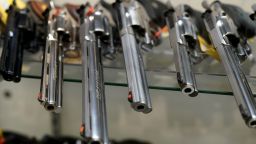City and law enforcement officials across New York state are worried that a looming US Supreme Court decision could lead to more people concealing and carrying guns – and officials are considering legislative efforts to counter the potential ruling.
A ruling from the Supreme Court on the legality of New York’s gun permitting system could come as early as this week, with some in the state worrying that a decision to overturn the state’s law will make gun access easier and gun crime more common.
At a press conference Monday, Eric Adams, mayor of New York City, said the potential for New York’s law to be overturned “keeps me up at night.”
“We’re going to look at the ruling because the ruling could be on several different levels. We’re going to look at the ruling and see what powers we have and what are we going to need from our federal lawmakers to sort of put laws in place that could prevent the Supreme Court ruling from impacting our cities,” he said.
Officials stressed that even if this does change it won’t happen overnight and there will be some time for everyone to get acclimated.
New York doesn’t allow people to carry guns outside their homes unless they’ve first showed the state “proper cause” to carry a firearm; the question before the court is whether licensed gun holders who want to carry should have to prove their need to carry a gun to the state. If the court makes it easier to get a conceal carry permit, officials expect more people to conceal and carry guns.
“I’m very concerned,” said Suffolk County Police Commissioner Rodney Harrison, a former top commander at the New York Police Department who’s now the top cop in a large suburban county on Long Island, New York. “John Q. Public gets a gun he’s not trained to use and now he comes up on someone he thinks is committing a crime.
“Next thing you know, people are going to try to be super cops and take things into their own hands. Now you have a shooting incident that didn’t warrant that type of result,” Harrison said. “There are a lot of violent incidents that come from people carrying firearms. Are they properly trained? Will they take matters into their own hands? People not trained, taking matters into their own hands, is concerning.”
Lower courts have broadly allowed good-cause permitting but those are in conflict with a DC case where a court overturned the district’s good-cause requirement. Every state allows the concealed carrying of handguns in public, according to EveryTown for Gun Safety, a gun safety advocacy group.
Half of the states, including New York, require some permitting process for carrying concealed handguns in public. Twenty-two states require some training to conceal and carry, and eight states require a person to “show good cause or special need” to carry a concealed gun in public and get a concealed-carry permit. According to EveryTown, about 25 percent of America’s population lives in “proper-cause” states like New York.
Law enforcement groups split on issue
A ruling that overturns New York’s law could lead to significantly more people concealing and carrying guns in New York by making the permitting process easier for potential gun carriers and limiting the state’s ability to deny permits.
New York already prohibits people under 21 years old from concealing and carrying, and restricts where people can carry guns – they are banned in roadside rest areas and state parks, and the law defers to hotels and employers on whether guns can be kept on the those properties.
Law enforcement groups who weighed in on this casecase before the US Supreme Court were split over the issue of New York’s gun laws.
Former police chiefs, in a brief filed in September, said that “may-issue” gun permitting laws that give states discretion on how they approve gun permits were “a critical component of their obligation to safeguard … their citizens.” That group included Bill Bratton, considered an elder statesmen in law enforcement leadership circles, along with former police chiefs from Chicago, Philadelphia, Milwaukee, Boston and elsewhere across the country.
Separately, law enforcement advocacy groups from New York to California and a handful of shooting and gun associations argued that the outbreak of “murders and shootings” since the 2020 death of George Floyd heightened the need for “self-defense where it is most frequently needed: outside the home.” That group included national and local policing groups, sport shooting groups from across the country, and police education and legal groups.
Some states have legalized permit-less carry since the onset of the pandemic, which typically allows adults to carry guns without any permitting or screening process. Some law enforcement groups objected to that.
Harrison said guns complicate police response to any incident.
“Think about the police officer that sees a person carrying a firearm, what disadvantage are you putting that officer in that’s used to dealing with people in a certain way that carries a firearm. Now we’re going to be in a state of confusion,” Harrison said.
Prosecutor concerned about ‘ramifications’
Bronx District Attorney Darcel Clark said the borough has struggled with gun violence. Clark, who currently has 1,200 open gun cases, says changes to the law could create issues for prosecutors.
“I don’t know what this is going to do to the current cases,” Clark said. “I don’t know if some defense attorney will say ‘this was illegal but now my client wants to apply for a license.’ I don’t know what the ramifications will be.”
There have been 216 people shot in the Bronx so far this year and police have recovered 552 guns from arrests, according to Clark. And while some want to carry a gun for protection, Clark says carrying a firearm doesn’t make you more safe.
“They could also be killed,” she said. “Just because you have a gun doesn’t mean you’re safer than somebody else. In the cases we have now, both sides have guns and both sides are getting killed.”
Clark added that even having someone with a weapon possibly intervene would not necessarily make anything better.
“That good guy with a gun could still be a good guy with a gun but also hurt somebody else,” Clark said, adding that many victims that have been shot were hit by stray bullets. “Even with the police there is friendly fire. Guns are dangerous in the hands of whoever.”
Manhattan District Attorney Alvin Bragg sent a memo to his staffers detailing a game plan after the Supreme Court issues its opinion.
In the memo, emailed to staffers on June 1, Bragg says prosecutors are not only bracing for the types of lawsuits they might see but they also will partner with local and state authorities to make sure they can use the existing laws to minimize gun violence concerns.
“If the Supreme Court does issue the type of opinion that many predict, we will have to innovate and adapt to meet the new public safety challenges that the decision may pose — and we will,” Bragg said in the memo.
Bragg said a team is already in place ready to read and analyze the ruling the moment it becomes available, according to the memo.
Prosecutors in his office already expect a rush of court filings, including bail applications to motions to dismiss, and will be prepping their teams on how to counter those filings.




